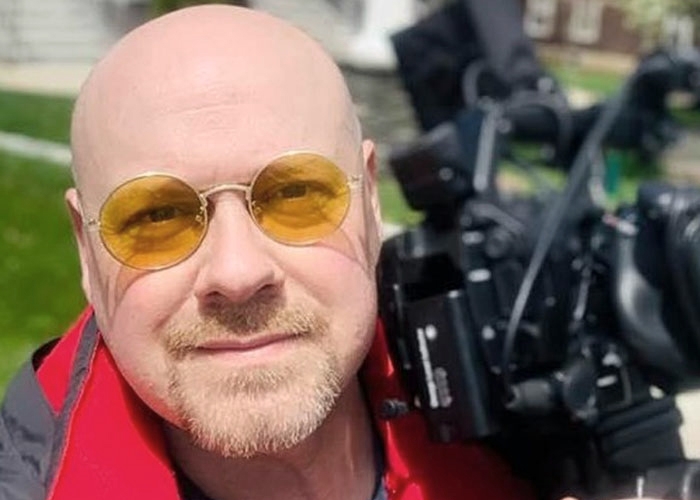
A view behind the camera of award-winning filmmaker Christian de Rezendes.
Christian, how do you respond to people who say, “You want to make a career out of filmmaking? You’ll never make any money!”
“You prove them wrong by doing it,” he says.

For over three decades, Christian de Rezendes has been doing what he loves best – making films. Today the RIC film studies major is an award-winning filmmaker.
His latest project, a historical docu-series “Slatersville: America’s First Mill Village,” recently won two regional Boston/New England Emmys® – one for director and one for musical score. (This is the second Emmy for the series’ musical score.)
de Rezendes says of the win, “It’s a significant honor to receive multiple Emmys, and it’s something I’m very grateful for. My film production company has won three, but this is the first time I’ve won one in my name. It’s also quite moving to know that this project, so long in the making, has gotten to this point. It feels incredibly good and a little surreal.”
Work began on this project over a decade ago. “Slatersville” retraces the 200-year history of the first industrialized mill village in the United States. Over 150 interviews were conducted and thousands of images and historic materials were sorted through to bring this epic history of a village in North Smithfield, Rhode Island, to life.
“Truthfully, when I started the film, I didn’t know 90 percent of the history that wound up making up the film,” he says. “In fact, I remember when I told someone I was working on a documentary about Slatersville, he kind of chuckled and said, ‘How long is that film going to be? Five minutes?’ There just didn’t seem to be a lot to tell about Slatersville. It takes about five minutes to drive from one end of town to the other.”
In fact, there’s a lot to tell about Slatersville. What de Rezendes thought would be a 90-minute film turned into an 11-episode docu-series.
The first five episodes premiered on Rhode Island PBS in 2022. The next three aired in 2024. The final three are currently in post-production. In total, they span three seasons. (See Season 1 trailer below.)
de Rezendes admits it was a challenge to construct a narrative out of so much research. “It’s like you’re constantly puzzle making,” he says. “Even though it’s exhausting, that’s where the life of it is for me. I like things that are densely layered.”
“In this film, you cannot tell the story of the mill without including the most deplorable business enterprise of the American South – slavery, and the Black men, women and children who furnished the cotton that ran the mill,” he says. “You cannot talk about the mill unless you talk about the child immigrants – mostly French Canadian, who worked in the mill as young as age six and who lost digits or limbs to accidents and who were punished by being strapped to the water wheel. Slater was making money off of the economy of slavery. Not many people make that connection.” (See Season 2 trailer below.)
de Rezendes enlisted a number of RIC film studies majors to assist in the production of the film over the 10-year stretch. Like these interns, the young de Rezendes was hungry for experiences behind the camera.
“I knew I wanted to be a filmmaker since I was a kid,” he says. “I started studying film seriously when I was age 13 or 14. I was particularly fascinated by the careers of directors. By the time I began studying at Rhode Island College in 1996, I knew entire bodies of directors’ works.”
In his freshman year, he started his own film production company – Breaking Branches Pictures. In his sophomore year, he took a six-week course at New York University to earn a certificate in 16mm filmmaking. After graduating from RIC in 2000, he began in earnest to create his own works.
Last year, de Rezendes was invited by Rosalind Sibielski, RIC assistant professor of film studies, to give a talk to RIC students about his career.
He notes that the biggest challenge in making films is getting funding. “I joke and say I spent more time TRYING to make ‘Slatersville’ than I did making ‘Slatersville.’” With recent cuts in federal funding for the arts, the challenge to complete the series has become even greater.
Yet filmmakers don’t have to become starving artists, he says. There are many other ways a filmmaker can use their skills to generate income while they’re creating their tour de force.
“You just need to take the craft that you love and adapt it to making a living,” he says. “A lot of people start off shooting music videos, weddings, corporate videos, commercials or promos,” all of which de Rezendes has done.
“But you have to balance that by putting time into a film that you really want to do,” he says. “When I started out, I was doing 90 percent assignment jobs and 10 percent of what I wanted to do. Now that’s flipped; however, it’s taken a long time to flip.”
But his perseverance has paid off.
Along with “Slatersville’s” multiple Emmy’s, the docu-series has also garnered one Gold and two Bronze Telly Awards, an Outstanding Achievement Award by the Massachusetts Independent Film Festival, the Television Award by the LifeArt Festival and two Lighthouse Spotlight Awards by the Block Island Film Festival.
The first two seasons are available to stream for free on Tubi, Prime Video and YouTube Movies & TV. The first season is also available to stream on ripbs.org. The final season’s first episode premieres on Labor Day, Sept. 1, at the Museum of Work and Culture in Woonsocket.
de Rezendes is currently holding talks and screenings at schools, libraries, museums, historical societies and other organizations about the making of “Slatersville.” Learn more by visiting Breaking Branches Pictures.
Also, explore RIC’s B.A. in film studies program.
